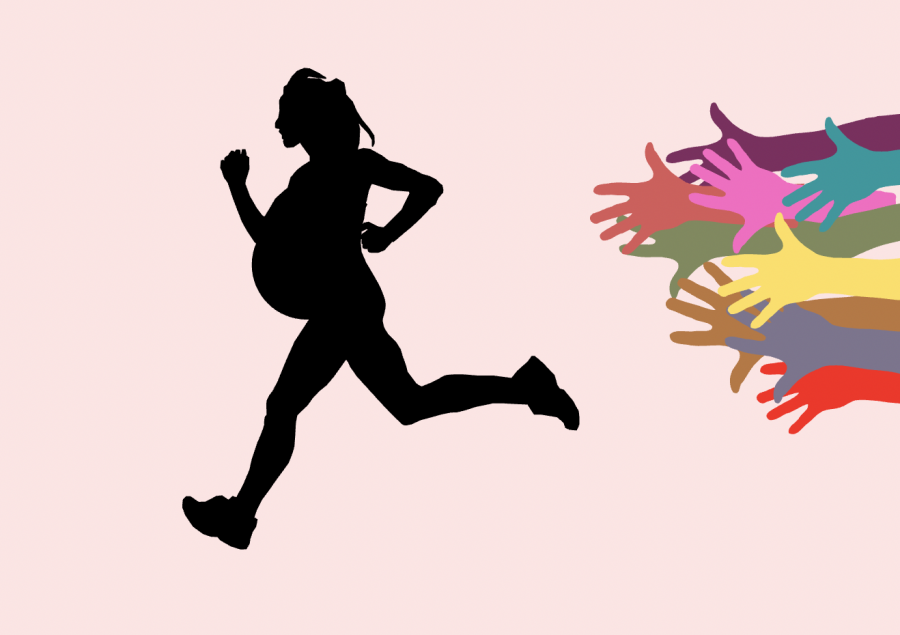Just Do it: Athletes need equal representation when sponsoring with Nike
Credit: Genevieve Morrison
WSPN’s Emily Roberge discusses the inequalities of female athletes in their sponsorships with Nike.
November 23, 2021
Imagine you’re tuning into any professional sports event. During the commercial break you’re bound to see your favorite athletes promoting fast food chains, drink products or any clothing brand. As the profitable face of the company, the athletes sell the image of the company. If a world-class athlete has it, why shouldn’t I? However, here lies a problem: the representation of female athletes is a facade. These female athletes rarely receive equal treatment from their sponsorships behind the scenes. For young female athletes, this sends a rather brutal message.
Female athletes are often overlooked in sports. Let’s be honest, our society thinks of sports as a “man’s world.” I wish it didn’t have to be this way. It is true that male sports tend to generate more income, a greater fan base and more media coverage, but this doesn’t mean that female athletes should be pushed to the curb. They still deserve the same respect that male athletes receive in their multimillion dollar contracts.
Big-name brands like Nike are no stranger to treating their female athletes unequally. Allyson Felix, an 11 time Olympic medalist track star, left her sponsorship with Nike because of Nike’s poor treatment during her pregnancy to sign with a more-female focused athletic apparel company, Athleta. Joining her, Simone Biles, arguably the greatest gymnast of all time, left her six-year deal with Nike for Athleta. The alarming behavior of Nike inspired this trend, especially towards their pregnant female athletes. Clearly, female athletes are shifting away from the larger, more powerful brands for the smaller brands promoting what Biles says, “is the passion to help girls rise and know their own limitless potential.”
Big companies like Nike aren’t practicing what they preach. They promote ‘equality’ and ‘inclusion’ only when it is convenient to them and their profits, giving pregnant female athlete’s sponsorships the ax when they feel like it. Felix is not the only athlete to experience this discrimination. Other athletes, like World Champion medalists Alysia Montaño and Olympian Kara Goucher, also feared pay cuts from Nike during their pregnancies. That is absolutely terrifying for female athletes who want to start a family. Phoebe Wright said it best to the New York Times, “Getting pregnant is the kiss of death for a female athlete. There’s no way I would tell Nike if I was pregnant.”
Even though Nike changed their policy on Aug. 12, 2019, saying “If an athlete becomes pregnant, Nike may not apply any performance-related reductions (if any) for a consecutive period of 18 months, beginning eight months prior to an athlete’s due date,” this doesn’t cancel their previous wrongdoing.
While Nike created an ad that seemingly celebrated the importance of motherhood and pregnant athletes, they were mistreating their own female athletes. That’s where the problem lies. Performative activism doesn’t cut it. Now that there is some revision in the fine print, we must see some changes.
Despite Nike’s poor treatment of their pregnant athletes, it’s not completely their fault; these issues stem from greater societal beliefs. Let’s be honest. Society thinks that motherhood can cut a female athlete’s career short. There are many male athletes who are fathers, yet that doesn’t dictate the success of their career, so why let it deter the success of female athletes becoming mothers? Of course the inclusion of maternal leave is complicated, but who says this should limit the opportunities for female athletes.
Nike is a culprit of also creating a toxic body culture. Alberto Salazar, a Cuban immigrant, was inducted in 1976 to our very own Wayland High School Athletics Hall of Fame. He was also the coach of Mary Cain, a standout high school track star at the “Nike Oregon Project,” who he would emotionally and physically abuse. Under his coaching, she would go on to suffer five broken bones, three years of missing her period and suicidal thoughts as she developed an eating disorder. This feels awfully close to home.
Even though Salazar wasn’t involved in Nike’s mistreatment of pregnant athletes, he represents yet another male employee of Nike who ruined the life of a female athlete. Although his early achievements were phenomenal, his later legacy did more harm than good. We can’t let the later generation of Wayland graduates act like this.
I’m tired of seeing female athletes not being given the representation they deserve. There doesn’t have to be a definitive line between motherhood and their athletic careers. They can be intermixed. If a woman chooses to have her baby, she shouldn’t have to fear losing all her endorsements. Female athletes shouldn’t have to live in a body toxic culture as well, enduring physical and emotional abuse by coaches. It’s not the way things are supposed to be.





![Last Wednesday, the Wayland School Committee gathered to discuss a number of topics regarding the health curriculum and Innovation Career Pathway course. Another large topic of conversation was the ways to potentially mitigate distracting cell phone usage. "These [phones] are going to distract your learning and social relationships," Superintendent David Fleishman said. "That's concrete right there."](https://waylandstudentpress.com/wp-content/uploads/2025/06/Screenshot-2025-06-04-at-9.49.31 PM-1200x886.png)



























![Troy Hoyt finishes the Boston Marathon, running for the Hoyt Foundation. T. Hoyt is the son of Hoyt Foundation CEO Russ Hoyt.
“[Running a marathon] might seem like a big thing, when it’s presented to you at first, but if you break it up and just keep telling yourself, “Yes, you can,” you can start chipping away at it. And before you know it, you’ll be running the whole 26 miles, and you won’t even think twice about it.” T. Hoyt said.](https://waylandstudentpress.com/wp-content/uploads/2025/04/C36E8761-1CBB-452E-9DF2-543EF7B1095E_1_105_c.jpeg)














































